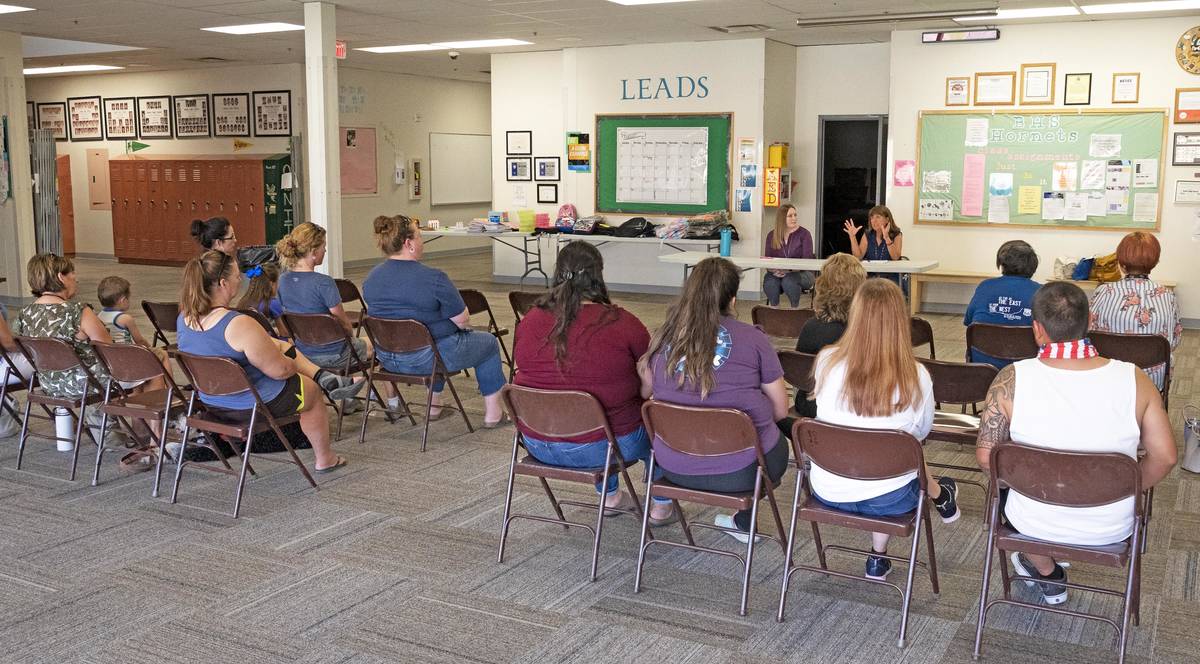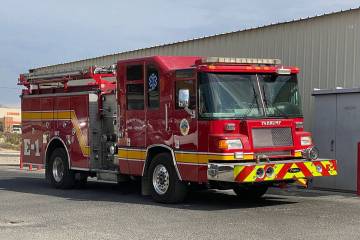Beatty voices school COVID recovery concerns
The impact of COVID-19 on education was spotlighted Aug. 4, as a group of parents and school faculty and staff met in the Beatty High School commons to help Nye County School District decide how to use American Rescue Plan funding to help overcome the effects of the pandemic on students in the community’s schools.
School counselor Teresa Sullivan said that everyone worked hard last year to make the best of the situation, with teachers staying after school and working extra hours. Despite their best efforts, however, the pandemic negatively impacted students academically, socially, and emotionally.
”We felt pretty defeated,” she noted.
Academically, many students have fallen behind grade level, including high school students who will have to postpone graduation due to lack of required credits.
Principal Chris Brockman said that credit recovery will be an arduous task that will not be completed in a single year. He said that they would like to be able to accomplish it without overloading classrooms or the Pathways program.
Brockman and other faculty spoke in favor of using some of the grant money to fund having a person in the school all day each day specifically to work with students on credit recovery.
The principal also said that, since Beatty is on a four-day school week, with funding for busing and personnel, Friday might be used as a credit-recovery day.
Some parents said they had a difficult time working with their children who were schooling online. In some cases they had problems understanding the software, and, as one father put it, “It’s harder to interact with my daughter when everything is on the computer.” He said that it was easier to read with her when she had textbooks.
The biggest academic complaint with online learning was that many students simply were not motivated to complete their assignments.
For secondary students, the loss of sports and extra-curricular activities was also mentioned as contributing to this lack of motivation, as students are required to keep their grades up in order to participate in them.
Some parents, themselves former Beatty students, lamented not seeing their children participating in the kinds of activities—sports, music, drama, and so on—that they enjoyed as youth.
Sullivan also said that it was important not to push students and faculty too hard, to leave “room to breathe” so that “people don’t break.” She also said that activities and clubs are important for students, that “you lose a little of the person you’re trying to develop” without them.
Another suggestion was that grant money might be used for child care for people willing to volunteer as classroom aides. Sullivan also said that this might help with the school’s faculty recruiting problem.
NCSD staff member Karen Holley, one of those conducting the meeting, said that the school district is making training videos available for students and parents to help them understand such things as how to use technology. She also said that it is going to cost the district about a million dollars to replace aging student Chromebooks.
Physical facility needs also came up, with Sullivan saying that the high school needed work on the ventilation system to help hinder the transmission of COVID-19. She also pointed out that the classrooms are too small to facilitate social distancing.
Teacher Ellice Dunsterville also said that flooring in classrooms needs to be something like vinyl that is more easily sanitized.
Any community members who did not attend the meeting but would like to contribute to the discussion of how to spend the relief funds can do so by taking the survey at https://bit.ly/ncsdgrantneeds
Richard Stephens is a freelance reporter living in Beatty.

















